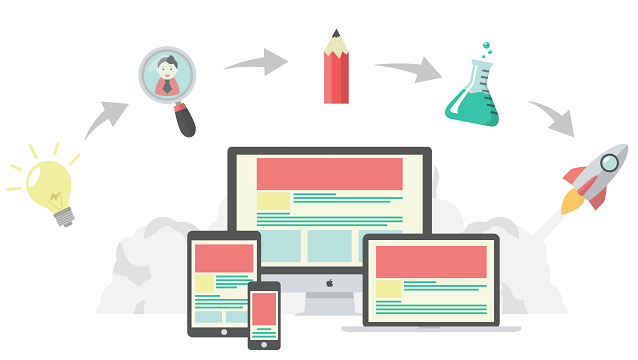When it comes to Digital Experience of Customers, UX kept the center stage in 2018. This pivotal role will continue as well. There are some trends that are expected to be there in 2022 & beyond. So, let’s take a look at the most dominant UX trends.
The shift from Flat Design to Material Design:
Flat Designs are likely to fall out and Material design will be the way to go. Material designs were introduced in 2014, and since then User Experience Designs have evolved to be more engaging with the help of features like 3D Icons, Animations, Transitions, Light and Shading features, etc. Things have moved from Bland, Minimal and flat designs to more interactive, lively, detailed (patterns and textures), customizable, adaptability to various device and towards a highly User-Centric Approach to designing.
Good read: flat design vs material design
Voice-Recognition Features:
Voice Assistants like Siri, Alexa, Google Home, Echo, etc. have caused a massive boom in User Interface technologies and functionalities and this will continue to affect UI and UX designs in 2019 as well. According to a report by Grand View Research, United States market for Intelligent Virtual Assistants will grow at an estimated CAGR of 36.7 percent from 2016 to 2024. Voice-Activated Interfaces eliminate the need to type and are thus the next big trend in 2019. Nowadays 90 percent accuracy in Voice-Commands is a norm and this makes Voice-Enabled Interface a great Technology.
Video Content rising:
Content has many shapes, gone are the days when just plain text was enough. Videos are already doing their job in grabbing customer attention, this could be on an E-Commerce store or a Social media website or an Application. It is an amazing way to deliver the Customer experience created using content that matters to him or her. According to Cisco, 80 percent of all Internet traffic will be Video-Based by 2021. The average attention time of an internet user stands roughly around 8 Seconds. As you can see this is only a slight amount of time available to capture user’s attention and so videos are best for this purpose.
Personalized Interfaces:
Users love and prefer interfaces that are personalized according to their taste and for their convenience. It is part of the Human nature that things appear more appealing when they are personalized for us. That is why 33 percent of customers who snap out of relationship do so because of the lack of personalization. Serving customer’s needs, based on their past practices, interactions at various stages and points of interaction, purchases, preferences, choice, reviews, etc. goes a long way in providing a personal feel to the user or customer. A personalized UX learns and adapts itself according to the user’s behavior, hence it is a highly dynamic trend.
Simple and Time-Saving Navigations:
An average user leaves a Web Page if it takes more than 3 seconds to load. Comprehensibility and Transparency will be the center of everything in 2019. Accordingly, the importance of Applications and Web pages cannot be emphasized enough. Navigations should be simple, clear and time-saving as much as possible. The flow of functions and features should be simple so that problem solving through interactions is simple. And that is why the ideal load time for an application is less than 2 seconds.
Augmented Reality has emerged:
Screen type Interfaces will not be the only type of interfaces UX Designers will be designing in the coming years. Augmented Reality has emerged in full force. AG is indeed the top trend in UX designs during 2019. Zion Market Research states that the market size of Augmented Reality is expected to grow at a CAGR of 82.5 from 2016 to 2121. Brands like Walmart are already using Augmented Reality in their content and the developers around the world are trying to make AR a part of their applications. Hence it has moved out of the Gaming World and into the Retail universe.
Biometric Authentication:
To be precise it is not the latest trend in UX but it is a revolutionary technology as it is exploring more and more use cases. We are living in a time where Security breaches have brought businesses to death and so Authentications and Identity Management are of prime Concern. According to a report by markets and markets named as Mobile Biometrics Market by Components, Biometrics Market for Mobile platforms is expected to grow at a CAGR of 29.3 percent from 2016 to 2022. Biometric Authentication is here to solve issues and problems faced with regard to security. Hence it has the potential to become an extremely important UI and UX trend. This is because it has the ability to ensure security for both the end users as well as the business interacting with these users. The banking sector is delivering an amazing digital experience to the users by incorporating Biometric Authentications in their UX Designing. Also Authentication via Facial Recognition, fingerprints, Voice-Recognition, and Retina scan is becoming the latest Mobile Device UX trend and has already gained momentum in the industry.
Design that fits any device:
Nowadays a large number of devices are interconnected to create the overall experience for the user. So the aim now is to deliver a seamless experience no matter what the device is being used. Mobile-Friendly is not that is required now but Mobile devices should come first. A business cannot succeed without a Device-Agnostic Design because that is what is going to lead the game.
Foldable Displays are now a thing:
Foldable Displays are a reality now. Not just the prototypes but the final products are here. Brands like Samsung, LG, and Huawei have all shown their mobile devices with foldable displays that are set to hit the markets soon. This is another challenge for the UX designs as these foldable displays will require a different type of UX technologies and features.
To know more connect with web design company India!
